- Home
- H A CULLEY
THE POWER AND THE GLORY Page 4
THE POWER AND THE GLORY Read online
Page 4
More Mercian eorls answered his summons than he had dared hope for and even some from Middle and East Anglia joined him. Additional men from Rheged and Goddodin also arrived, admittedly they were mainly from the fyrd, but he now had over four thousand men under his command. Once Alweo and Catinus joined him, making the number of mounted warriors up to eighty, he moved.
‘I’ve no intention of letting Cadafael shirk this battle and I want Manwgan killed or captured in retribution for the part he played in the martyrdom of my brother,’ he told his assembled war leaders.
His tent was large but it was filled to overflowing by the eorls and other leaders who had crammed into it. The wind was getting up outside and the tent flapped making a noise that make conversation difficult. The king climbed onto a table so that he was visible amidst the throng and now he paused whilst his eyes engaged their upturned faces. Satisfied that he had their attention, he cleared his throat and raised his voice so that he could be heard.
‘Our horsemen and a thousand of the lightly armed fyrd will travel around the fort near Oswald’s Tree and take up position to the west to cut off their escape. We know that they are short of supplies and so we will sit at the bottom of the slope and wait for them to make a move.’
He eyes roved around those looking up at him until they lit upon his two sons. The eleven year old Ecgfrith was about to start his education at Lindisfarne with the novice monks. His father had brought him along to let him experience warfare for himself, albeit at a distance. His other son, Alchfrith, was nearly seventeen and the experience of command would be good for him. However, he would need someone with experience to advise him so that he didn’t make foolish mistakes.
He considered the options and then he searched amongst the assembled throng for Catinus and his friend Alweo.
‘The blocking force will be commanded by my son, Alchfrith, with advice from Alweo in charge of the horsemen and Catinus as leader of the fyrd,’ he announced.
One or two of the eorls were surprised at the king’s choice; not at putting Alchfrith in command - after all he was an ætheling who had just been made the ruler of Deira under Oswiu – but at the choice of the two Mercians as his deputies. Admittedly Alweo was still officially an ætheling in Mercia, but Catinus was a Briton who had been born a villein. Murmuring against Oswiu’s choice started to swell inside the tent until it could be heard above the flapping fabric of the tent. The king scowled and pointed his finger, shouting spoke above the hubbub.
‘Arthius, you have something to say? Spit it out man.’
The Eorl of Elmet seemed uncomfortable at being singled out but looked Oswiu in the eye as he replied.
‘You have favoured Catinus above your Anglian nobles time and time again. He has been raised up from his origins as a shepherd boy and made custos of your most formidable fortress. Now he is to lead the fyrd as your son’s deputy. You do too much honour to a humbly born Briton, Cyning.’
‘Did any of you recover my blessed brother’s head? Catinus risked his life to do so. Many have served me loyally, but none more so than this man. He may have been born a Briton and the son of a poor shepherd in Mercia, but he has proved himself time and time again in battle. He has a wise head on his young shoulders and he is a skilled tactician.
‘Look back at your own ancestors. You may have been born the sons of eorls but where did they come from? My great-grandfather was Ida, a minor Anglian chieftain until he landed on the east coast of what was then Britannia and built a fortress there. Eoppa, his father, was a fisherman. How was his social status different to that of Catinus’ father?’
There was silence in the tent now. All the eorls were proud of their nobility but they knew that they owed their present standing to their grandfather’s or great-grandfather’s emergence as leaders of the settlers who left their original homeland. None of the Anglian nobles across the sea had given up their land to come and settle in Britannia. The men who had carved out the new kingdoms had been farmers, shepherds and fishermen.
Arthius nodded. ‘I apologise to you and to Catinus. I acknowledge that he has proved himself a courageous warrior and a good leader in battle.’
A few of the others muttered agreement but most remained silent. They had yet to be convinced that Catinus deserved his place amongst them.
‘Good.’ Oswiu smiled. ‘Let’s go and besiege Cadafael, and this time make sure he doesn’t escape.’
As he watched the last man leave his tent he wondered why he kept favouring Catinus. When he had first come across him and his brother fourteen years ago he had nearly agreed with Ceadda’s demand that they be killed once their usefulness as guides had ended. He was glad he hadn’t listened to him, but he could have left him as an ordinary member of his warband. However, something about him convinced Oswiu that the young man was destined for greater things. His recent betrothal to the daughter of a thegn meant that his sons would be born noble and, although he had slightly belittled Eoppa’s standing by calling him a common fisherman, there were parallels between the history of his own family and that of Catinus.
The man’s brother, Conomultus, had done well too, rising in the church until he was now the king’s chaplain. He would be very surprised if he didn’t become an abbot or a bishop in due course. Conomultus was a devout Christian but he was also politically astute; a quality that the saintly Aidan and the present head of the Northumbrian Church, Finan, lacked, but which the Roman churchmen like John the Deacon and Archbishop Deusdedit, the leader of the church in the south of England, possessed in abundance.
The next morning was dank and miserable. Drizzle permeated everything as Alchfrith led his contingent around the hill fort well to the north to block the route between it and the rest of Powys. The young king was proud of his elevation to the throne of Deira, despite being only a sub-regulus under his father, and even prouder to have been given his own command. The weather hadn’t dampened his spirits, even if it had that of his men.
Unfortunately, he seemed to think that Alweo and Catinus were just there to follow his orders and not to advise him. He’d obviously turned a deaf ear to that part of his father’s briefing.
He started his advance without sending out scouts and when both of his deputies advised him to do so, he ridiculed the idea, saying that all the enemy were shut up in the hill fort.
‘They will have sent out forage parties, Cyning,’ Alweo said tactfully.
‘Well, they are hardly likely to pose a threat to us are?’ he joked.
‘No, but he needs to force them to abandon the fort and attack him. If we can stop them taking back supplies to the hill fort that would starve them out that much sooner,’ Catinus pointed out.
‘That wasn’t what he told me to do. We are to form a blocking force to stop supply columns from Powys reaching them and to kill them when they flee,’ he said stubbornly.
‘But can’t you see, locating and eliminating any foraging parties is all part of that strategy,’ Catinus said in exasperation. ‘That’s why he sent Alweo and the horsemen with us.’
‘Mind your tongue, peasant!’ Alchfrith snapped at him. ‘The eorls don’t understand why you are in command of my footmen and neither do I. One more outburst like that and I’ll replace you and you can take your rightful place in their ranks.’
Catinus seethed with rage and was about to make an intemperate retort when he saw the warning look that Alweo gave him. He bit his tongue and, muttering sotto voce about stupid, arrogant boys, he dropped back to join his men. When he’d calmed down he decided that he and Alweo would have to employ a little more subtlety to make a success of this task.
Alchfrith picked a place to make his stand which was a poor choice for a number of reasons. It was a shallow valley so fleeing Welshmen could get around his force easily; even worse, if the enemy retreated in good order, they’d be able to push in his flanks and trap him.
‘Doesn’t he understand anything about military strategy,’ complained Catinus.
‘Apparently no
t,’ Alweo replied, not making any attempt to keep his disgust out of his voice.
‘Is there any point in remonstrating with him?’
‘I wouldn’t have thought so; the obstinate little sod will just dig his heels in.’
‘So what do we do?’
‘I’ll send my men out early tomorrow to find a better position to the west of here. Then, as soon as the routed Welsh appear, we can withdraw before they reach us.’
‘He’s bound to ask where you and your scouts are.’
‘Then you can tell him we are watching the hill so we have advance warning if the routed army are coming this way, and also watching the approach from the west so we can intercept any supply carts.’
‘Thanks. Where will you be whilst I’m having to deal with the little brat?’
Alweo grinned. ‘Looking for a good defensive position to the west, of course.’
‘He had no right to go off without my orders,’ Alchfrith bleated. ‘And he certainly had no authority to take his men with him. Now I have no horsemen to act as my eyes and ears.’
‘That’s exactly what Alweo and his men will be doing,’ Catinus said soothingly, resisting the temptation to cuff the petulant youth around the head.
‘But he should be following my orders, not acting on his own initiative.’
‘Cyning, Remind me again how many battles you have won.’
‘What do you mean? You know that this is my first.’
‘Do you think your father was born with the experience needed to defeat his enemies, or do you think it’s conceivable that he learned his trade as war leader from listening to those with more experience than he had at the time? Even now he consults his senior eorls and leaders before making his mind up.’
Alchfrith’s face turned crimson and Catinus prepared himself to receive a tirade of abuse; instead the young king’s shoulders slumped and he appeared to be on the verge of tears.
‘So you think I’m being arrogant?’
Catinus was astounded at how quickly the young man’s bravado had turned to self-doubt. It had obviously all been a defensive screen to hide his insecurity. He considered a diplomatic reply but decided being honest would be more productive.
‘The thought had occurred to me, yes.’
‘I just want to make my father proud of me. He’s spent most of his life ignoring me; this is my chance to prove to him that I’m worthy of his regard.’
‘You won’t do that by failing in the task he has set you, Cyning. Why do you think he sent two of his best leaders with you?’
‘Not so you could tell me what to do; I’m not a child!’
‘No, of course not. But you might at least listen to our advice before making your mind up and giving us your orders,’ Catinus said patiently.
The young king looked doubtful, but then reluctantly decided that Catinus might have a point.
‘So what is your advice?’
‘To find a place which is more easily defendable and where you can’t easily be outflanked. Don’t forget we are assuming that we’ll be dealing with routed men. Cadafael might just as easily decide to give your father the slip and withdraw into the mountains of Powys and Gwynedd; he’s done it before. You do know that his nickname is Battle Shirker? In which case we’d be facing the whole Welsh army.’
A horrified look crossed the youth’s face and Catinus grunted in satisfaction. It seemed that, at long last, he was getting through to Alchfrith.
‘We must get Alweo back at once so that he can find a proper defensive position.’
‘His scouts know their business, Cyning. I wouldn’t be at all surprised if he returned with a choice of suitable places for you to decide between.’
~~~
Oswiu emerged from his tent as dawn broke the following day. Thankfully yesterday’s incessant drizzle had been replaced by a mixture of clouds and sunshine.
‘They’ve gone Cyning. The hill fort is deserted,’ Ceadda told him as the king relieved himself of the ale he’d consumed the previous evening.
‘So it seems that Cadafael has once more lived up to his nickname,’ he replied.
Then he realised what the overnight departure of the Welsh army meant. They were marching back into Powys and straight into the blocking force commanded by his son. Alchfrith would be outnumbered by well over two to one and most of his men were from the fyrd.
Ten miles away Alweo’s scouts rode back to report that the Welsh were on their way, marching in a column, a disorganised column to be sure, but evidently this was a planned withdrawal, not a hasty retreat. Catinus had decided to keep tactics simple. The fyrd weren’t capable of any complex movements; they had barely known how to form a shield wall before he’d started to train them two days ago. Now at least they could keep a steady formation with the best shield bearers to the fore and the bulk of the men pushing against their backs to hold the front two ranks firm.
They were lined up along the far bank of a river which no-one seemed to know the name of. It wasn’t a case of holding a ford this time, unfortunately, as the water was knee high at its deepest. However, it would slow men down and there was a steep, muddy – and therefore slippery – bank on the far side where Catinus’ men had formed up. The area on both sides of the stretch of river bank that Alweo had found was marshy and so the flanks were secure.
He had some one hundred archers and he stationed them at the rear of the spearmen from where they would be able to fire at high trajectory into the Welsh. They were all skilled with the bow, but they were hunting bows, less powerful than war bows, and the fyrd weren’t well enough trained for the bowmen to engage the enemy from in front of the shield wall and then retreat through it when the enemy got close.
Alchfrith sat on his horse surrounded by the twenty five men of his gesith some four hundred yards behind the river from where he could see what was going on. Catinus and his own warband were in the centre of the fyrd to stiffen them. Of Alweo and his horsemen there was no sign. The young king had fretted about having no reserve but eventually his two commanders had convinced him that a reserve would make no difference to their plan; either it would work or they were doomed.
The first Welshmen to arrive at the river didn’t wait for the two kings and the rest of their army to arrive before launching an attack. It was sheer stupidity. A third were hit by arrows whilst they were still crossing the river and the rest were easily repulsed by the spearmen manning the shield wall. Not only did it cost them over a hundred casualties needlessly, but it gave encouragement to the men of the fyrd. Most were unsure what to expect and were very fearful in consequence. Now they were much more confident – overconfident in some cases.
As more and more Welshmen arrived on the opposite bank that confidence evaporated as they realised that they were facing over twice their numbers. Furthermore, a good proportion of the enemy would be seasoned warriors. Catinus yelled out to his men, assuring them that they had repulsed the Welsh once and would do so again. Then he gave the order for the archers to fire another volley.
He watched as the dense cloud of arrows arced high in the air and came down amongst the milling foe some fifty yards away on the opposite bank. It was long range for a hunting bow but the Welsh suffered about thirty more casualties. Their own archers replied in a ragged volley but most of their arrows struck the shields of the first rank of the fyrd.
The casualties inflicted on the Welsh enraged them and another wave started across the river without orders. This time there were many more of them, perhaps three hundred in all. A second volley from Catinus’ archers disabled or killed about ten percent or more of them but the rest kept coming. This time it was more of a close run thing. The Welsh concentrated on the centre of the shield wall where Catinus and his men stood. Even they were forced back a couple of paces before he managed to get some rear rankers in from the flanks to add their weight to the centre. Slowly the Welsh were pushed back into the water.
This time the fyrd had quite a few casualties but the Welsh had
suffered many more. When they withdrew they left over a hundred behind. Many were only wounded but boys darted out to slit the throats of those on the bank and the river carried the other wounded away to drown.
At that moment Cadafael arrived and quickly assessed the situation. By the time that Manwgan had joined him he’d already decided to move further along the river to find another crossing place. The Welsh formed up to move off when Alweo appeared with his horsemen on the east bank – the same side as the Welsh. They cantered up to the rear of the column and threw their spears into the packed ranks before vanishing as quickly as they had appeared.
This panicked the rest of the Welshmen at the rear and they started to run to get away from a second attack. The men in front of them became unsettled and their anxiety communicated itself to the middle of the column. Their mood wasn’t improved when they saw that the fyrd on the opposite bank had marched around the marshy ground and were now shadowing them on the far bank.
At one point the river narrowed and the two armies moved closer together. Catinus seized the opportunity to order his archers to halt and send another cloud of arrows over towards the Welsh. A couple of dozen were killed or incapacitated but that wasn’t important. The fact that one of the dead was Manwgan was pure chance. The arrow had struck the neck of his byrnie and had been deflected upwards into his throat, nicking one of his two carotid arteries on the way. He fell from his horse and his life blood spurted out of him as he lay on the ground.
The men of Powys were now demoralised and leaderless. Manwgan’s only son, Eiludd, had been killed in the second attack across the river and his own son, Beli, was still a boy of fifteen. He and his chieftains did their best to rally their men but some had already started to slip away. The few gradually became a flood as Alweo pressed home a second attack on the rear of the column.

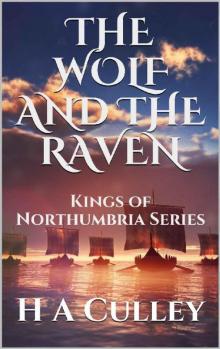 The Wolf and the Raven
The Wolf and the Raven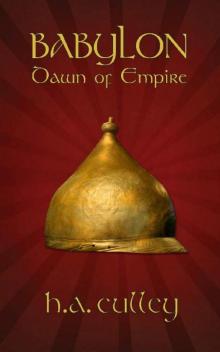 Dawn of Empire
Dawn of Empire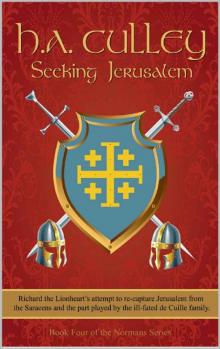 Seeking Jerusalem
Seeking Jerusalem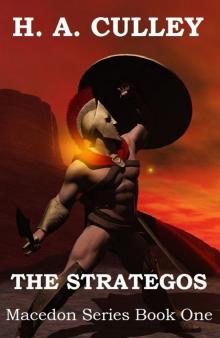 The Strategos
The Strategos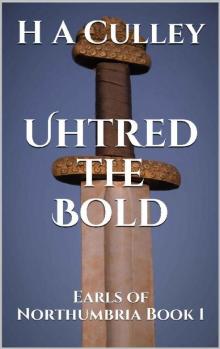 Uhtred the Bold
Uhtred the Bold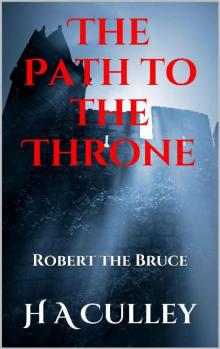 The Path to the Throne
The Path to the Throne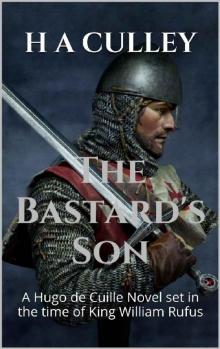 The Bastard's Son
The Bastard's Son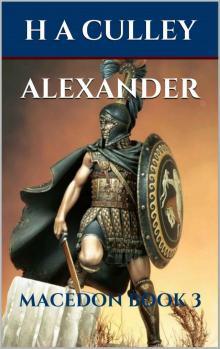 Alexander
Alexander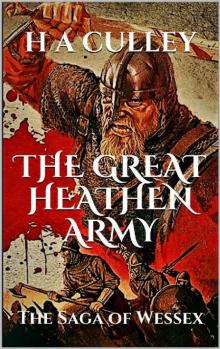 The Great Heathen Army
The Great Heathen Army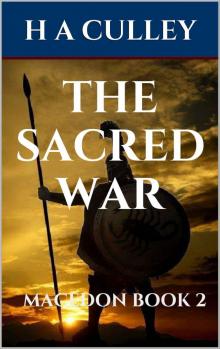 The Sacred War
The Sacred War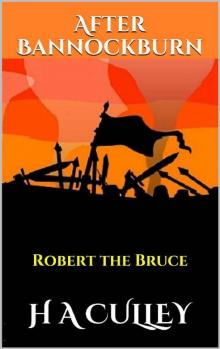 After Bannockburn
After Bannockburn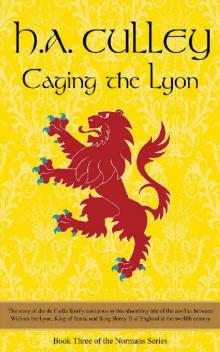 Caging the Lyon
Caging the Lyon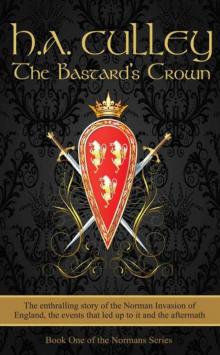 The Bastard's Crown
The Bastard's Crown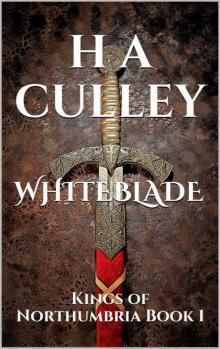 WHITEBLADE
WHITEBLADE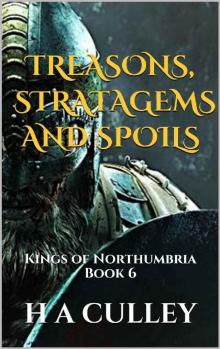 TREASONS, STRATAGEMS AND SPOILS: Kings of Northumbria Book 6
TREASONS, STRATAGEMS AND SPOILS: Kings of Northumbria Book 6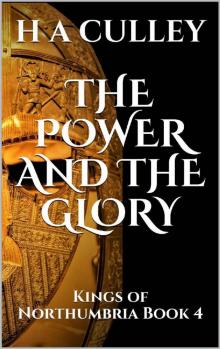 THE POWER AND THE GLORY: Kings of Northumbria Book 4
THE POWER AND THE GLORY: Kings of Northumbria Book 4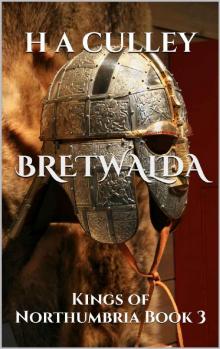 BRETWALDA: Kings of Northumbria Book 3
BRETWALDA: Kings of Northumbria Book 3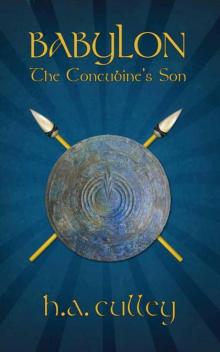 The Concubine's Son
The Concubine's Son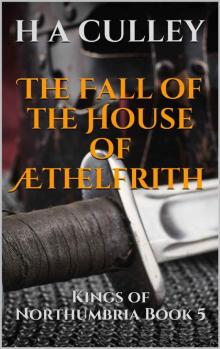 The Fall of the House of Æthelfrith: Kings of Northumbria Book 5
The Fall of the House of Æthelfrith: Kings of Northumbria Book 5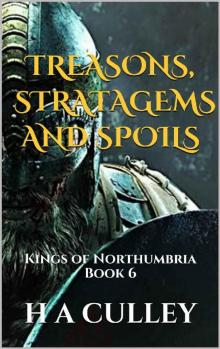 TREASONS, STRATAGEMS AND SPOILS
TREASONS, STRATAGEMS AND SPOILS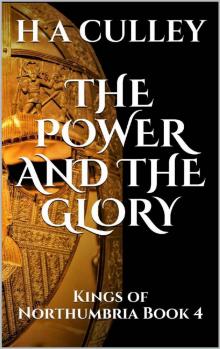 THE POWER AND THE GLORY
THE POWER AND THE GLORY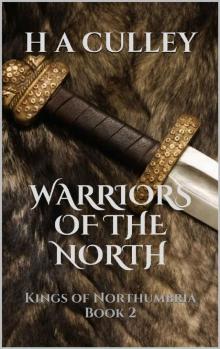 WARRIORS OF THE NORTH
WARRIORS OF THE NORTH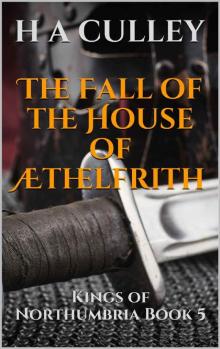 The Fall of the House of Æthelfrith
The Fall of the House of Æthelfrith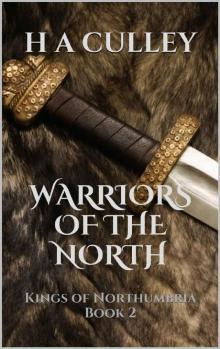 WARRIORS OF THE NORTH: Kings of Northumbria Book 2
WARRIORS OF THE NORTH: Kings of Northumbria Book 2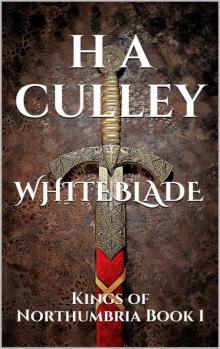 WHITEBLADE: Kings of Northumbria Book 1
WHITEBLADE: Kings of Northumbria Book 1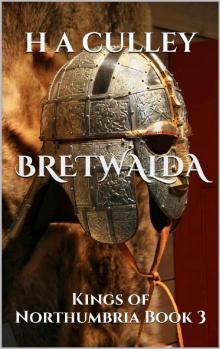 BRETWALDA
BRETWALDA